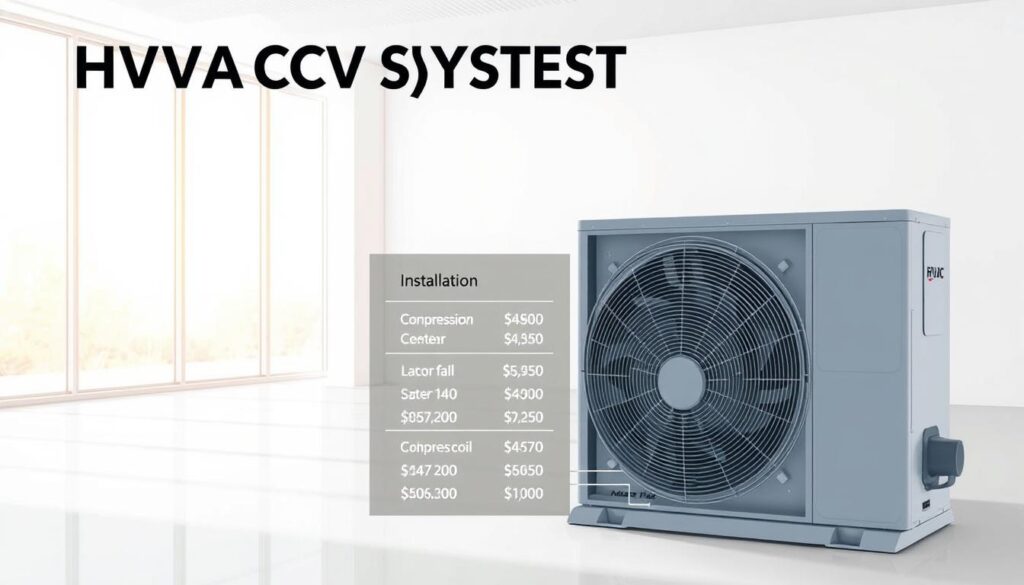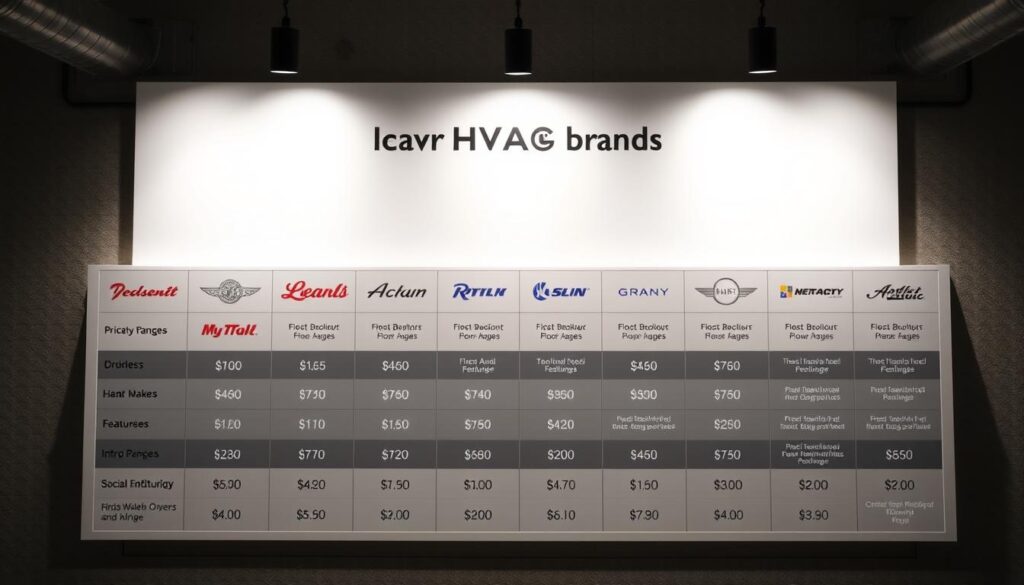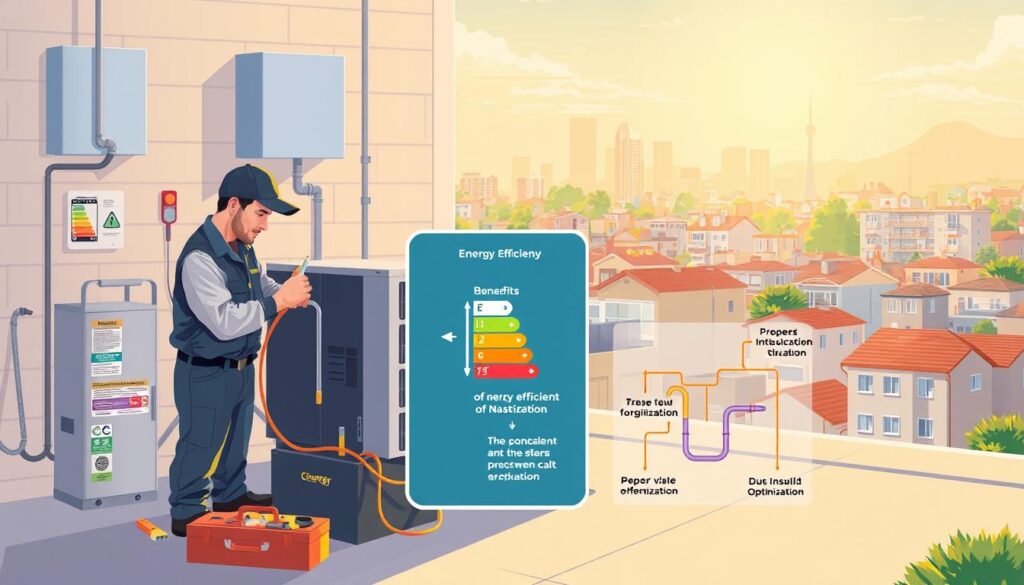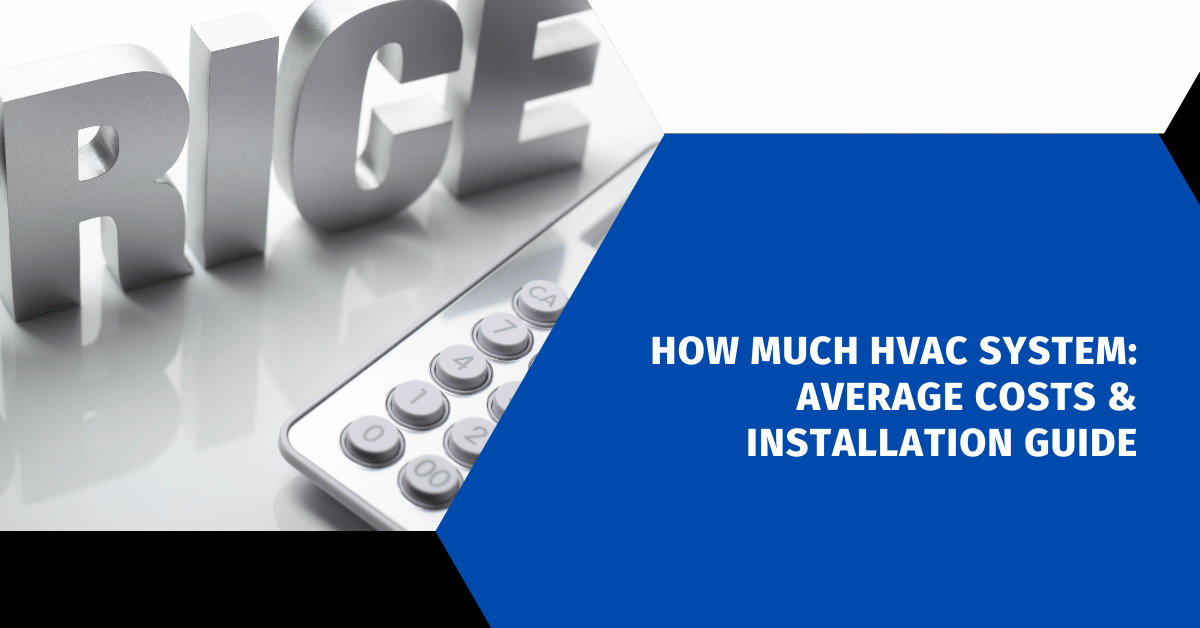Affiliate Disclosure
HVAC Guide Guys is a participant in the Amazon Services LLC Associates Program, an affiliate advertising program designed to provide a means for sites to earn advertising fees by advertising and linking to Amazon.
How Much HVAC System Cost? Are you curious about the cost of an HVAC system today? Figuring out HVAC installation costs can seem like a puzzle. There are many pricing options and technical details to consider.

Homeowners should expect to spend between $5,000 and $11,000 for a new HVAC system. The cost can change a lot based on your home’s size, the system’s complexity, and local prices.
Getting a new HVAC system is more than just buying equipment. You also need to think about installation complexity, your home’s layout, and energy efficiency. These factors can greatly affect your total cost.
Key Takeaways
- Average HVAC replacement costs range from $5,000 to $11,000
- Complete HVAC system installations can reach up to $16,000
- Costs depend on home size, system type, and local labor rates
- Energy-efficient systems may have higher upfront costs
- Professional assessment is key for accurate pricing
Table of Contents
Understanding HVAC Systems and Their Components
Your home’s comfort depends on a well-designed HVAC system. These complex networks of heating, ventilation, and air conditioning technologies work together to create the perfect indoor environment. Knowing about different hvac system types helps you make smart choices for your home’s climate control.
Modern HVAC systems come in various configurations, each designed to meet specific heating and cooling needs. The right system can greatly improve your home’s comfort and energy efficiency.
Types of HVAC Systems Available
- Central Air Conditioning Systems
- Furnace Heating Systems
- Heat Pump Systems
- Ductless Mini-Split Systems
Essential Components of Modern HVAC Systems
| Component | Function | Importance |
|---|---|---|
| Compressor | Circulates refrigerant | Critical for cooling process |
| Condenser Coil | Releases heat outside | Ensures efficient cooling |
| Air Handler | Moves conditioned air | Distributes temperature-controlled air |
The Role of Energy Efficiency in HVAC Systems
HVAC energy efficiency is measured through two key ratings: SEER (Seasonal Energy Efficiency Ratio) for cooling and AFUE (Annual Fuel Utilization Efficiency) for heating. Higher ratings mean lower energy consumption and reduced utility bills. Choosing an energy-efficient system can save you money and help the environment.
When picking an HVAC system, think about your home’s needs, local climate, and energy costs over time. Each system has its own benefits for different homes and climates.
Explore Our HVAC Shop
Looking for top-rated HVAC tools, parts, and accessories? Visit our shop and find the perfect solution for your needs.
Visit the ShopHow Much HVAC System Cost: Breaking Down the Numbers
Understanding hvac unit prices is key to planning your home comfort budget. The cost of an HVAC system changes based on several important factors. These factors affect your total investment.
When looking at hvac replacement costs, prices usually fall between $1,000 and $6,000 for the system alone. A typical 3-ton HVAC unit might cost between $1,700 and $5,000. Adding installation labor can increase your total cost by $1,000 to $3,000.
- Basic system costs: $1,000 – $6,000
- Average 3-ton unit price: $1,700 – $5,000
- Installation labor: $1,000 – $3,000
Your HVAC system price will depend on several key elements:
- System size and capacity
- Energy efficiency ratings
- Brand reputation
- Local market conditions
Investing in your HVAC system is a careful balance. You need to weigh upfront costs against long-term energy savings and performance. Researching and getting multiple quotes can help you choose wisely for your home’s comfort and budget.
Factors Affecting HVAC Installation Costs
Knowing what affects hvac installation costs is key for homeowners. Several factors influence the cost and complexity of your HVAC project.
Your HVAC sizing guide is vital for choosing the right system for your home. Different elements impact the total cost of your heating and cooling setup.
Home Size and Layout Considerations
The size of your home greatly affects hvac installation costs. Bigger homes need more powerful systems, raising the cost. Important factors include:
- Square footage of living space
- Ceiling height and room configurations
- Insulation quality
- Number of windows and doors
Geographic Location and Climate Impact
Your area’s climate is a big factor in choosing an HVAC system. Places with very hot or cold temperatures need stronger systems, which can increase costs.
- Extreme hot or cold climates require specialized systems
- Humidity levels influence equipment choices
- Regional energy efficiency standards
Labor and Installation Requirements
Professional installation costs more than just the equipment. The complexity of your home and local labor rates add to the total cost.
- Ductwork modifications
- Electrical system upgrades
- Technician expertise and hourly rates
- Permit and inspection fees
Pro tip: Always get multiple quotes and ensure detailed assessments of your specific home requirements to optimize your HVAC investment.
Explore Our HVAC Shop
Looking for top-rated HVAC tools, parts, and accessories? Visit our shop and find the perfect solution for your needs.
Visit the ShopCentral Air Conditioning and Furnace Costs
Exploring hvac system types, we find central air conditioning and furnaces are key for comfort. Knowing hvac unit prices helps in choosing the right heating and cooling for your home.
Central air conditioning systems cost between $3,500 and $7,500 for installation. Prices change based on several factors:
- Home square footage
- Unit efficiency ratings
- Brand selection
- Regional climate conditions
Furnace installations also require a big investment, costing between $2,500 and $6,000. Your costs depend on:
- Fuel type (gas, electric, oil)
- System efficiency
- Home insulation quality
- Existing ductwork configuration
Pro tip: Higher efficiency systems might cost more upfront but can save significant money on energy bills over time.
When choosing hvac system types, think about your local climate, home size, and energy efficiency goals. Talking to a professional HVAC technician can guide you through the complex world of hvac unit prices. They can help you find the best solution for your home.
Heat Pump and Mini-Split System Pricing
Heat pumps and mini-split systems are new ways to keep your home comfortable. They are energy-saving and flexible, unlike old heating and cooling methods.
Knowing the prices of these systems helps you choose the best for your home. Let’s look at the different heat pump and mini-split options:
Air Source Heat Pump Costs
Air source heat pumps can both heat and cool your home. They cost between $3,000 and $10,000, based on your home’s size and needs.
- Standard air source heat pump: $3,000 – $5,000
- High-efficiency models: $5,000 – $10,000
- Factors affecting price:
- Home square footage
- Local climate
- Energy efficiency rating
Ductless Mini-Split System Expenses
Ductless mini-split systems heat and cool specific areas of your home. They cost between $3,000 and $6,000 for a full installation.
- Single-zone systems: $2,000 – $4,000
- Multi-zone systems: $4,000 – $6,000
- Benefits include:
- Zoned temperature control
- Energy efficiency
- Easy installation
Geothermal Heat Pump Investment
Geothermal heat pumps are the most advanced option. They need a big upfront cost, usually $15,000 to $35,000.
Even though they cost a lot at first, they can cut your energy bills by 30-70% compared to old HVAC systems.
The exact cost depends on your home, local geology, and how hard it is to install. Talking to a pro can help find the best deal for your home.
Explore Our HVAC Shop
Looking for top-rated HVAC tools, parts, and accessories? Visit our shop and find the perfect solution for your needs.
Visit the ShopHVAC Brand Comparison and Price Ranges

Choosing the right HVAC system means knowing about different brands and their prices. Top makers offer unique values that affect your comfort and energy use over time.
Looking at hvac system types, some brands are known for quality and performance. Here’s a detailed look at leading HVAC brands:
| Brand | Price Range | Key Features | Efficiency Rating |
|---|---|---|---|
| Carrier | $3,500 – $7,500 | Advanced noise reduction, smart home integration | Up to 21 SEER |
| Trane | $4,000 – $8,000 | Robust durability, complete warranty | Up to 20 SEER |
| Lennox | $4,500 – $9,000 | High energy efficiency, precise temperature control | Up to 26 SEER |
Your choice depends on several key factors:
- Budget constraints
- Home size and layout
- Climate considerations
- Long-term energy savings
Pro tip: While premium brands like Lennox offer top efficiency, mid-range options from Carrier and Trane are great for those on a budget.
It’s wise to talk to a professional HVAC technician. They can suggest the best system for you, balancing cost with long-term energy savings and comfort.
Installation Costs and Labor Expenses
When planning to get a new heating and cooling system, knowing the costs is key. HVAC installation isn’t just about the equipment. Labor costs are a big part of the total cost.
Professional Installation Requirements
Getting a pro to install your HVAC system is important. They make sure it works well and safely. Their skills affect how long your system lasts, how much energy it uses, and if it meets safety standards.
- Performance longevity
- Energy efficiency
- Warranty compliance
- Safety standards
Permit and Additional Fee Considerations
When planning your HVAC installation, remember to budget for extra costs. You’ll need to get permits from your local government. These permits are required for both replacements and new installations.
| Permit Type | Cost Range |
|---|---|
| HVAC Replacement Permit | $100 – $250 |
| New Installation with Ductwork | $250 – $1,500 |
Timeline and Labor Cost Factors
The cost of HVAC installation changes based on several things. Technicians usually charge between $75 to $150 an hour. The time it takes depends on:
- System complexity
- Home size and layout
- Ductwork modifications
- Local market rates
Pro tip: Always get multiple quotes and understand the full scope of installation to avoid unexpected expenses.
Explore Our HVAC Shop
Looking for top-rated HVAC tools, parts, and accessories? Visit our shop and find the perfect solution for your needs.
Visit the ShopWays to Save on HVAC Installation

Getting a new HVAC system can cost a lot. But, smart homeowners find ways to save money. They look into hvac financing options and follow hvac maintenance tips to cut costs.
Here are some ways to save on HVAC installation:
- Choose high-efficiency systems with superior SEER ratings
- Research available government rebates and tax incentives
- Compare multiple installation quotes
- Schedule installations during off-peak seasons
Energy-efficient systems cost more upfront. But, they save you money on bills. Many makers and local governments give money back for eco-friendly HVACs.
| Savings Strategy | Potential Cost Reduction |
|---|---|
| Energy Star Certified System | 10-30% Lower Energy Costs |
| Federal Tax Credits | Up to $500 Immediate Savings |
| Manufacturer Rebates | $100-$300 Instant Discount |
Looking into hvac financing options can help. Contractors offer payment plans with low interest. Credit unions and home improvement loans also help spread out costs.
Following hvac maintenance tips can save you money too. Annual professional inspections and regular filter changes are small steps to big savings.
Smart homeowners focus on both saving now and being efficient in the long run when they upgrade their HVAC systems.
Conclusion
Understanding the cost of an HVAC system is more than just looking at the price tag. It affects your home’s comfort, energy use, and future costs. Choosing the right system for your needs is key.
When looking at HVAC costs, think about how long the system will last. Most systems last 15 to 25 years with regular care. Keeping your system in good shape can save you money in the long run.
Look for several trusted HVAC contractors and ask for detailed quotes. Check the energy efficiency ratings. A higher initial cost might save you money on bills. You want a system that’s comfortable and affordable.
Planning carefully and making informed choices can make your HVAC system worth it. Knowing your local climate, your home’s needs, and future savings helps you make a wise choice. This way, you get the best value for your heating and cooling system.

